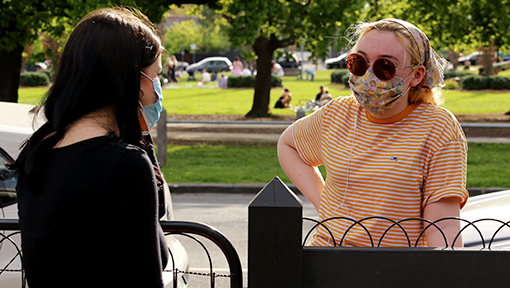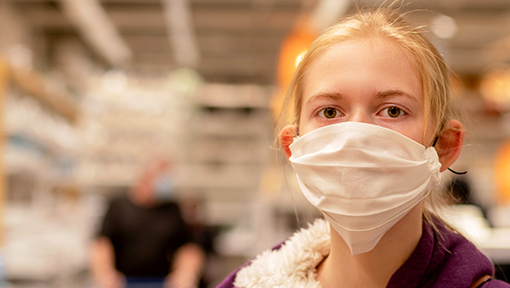Coronavirus had a stark impact on the mental wellbeing of young Australians, with a new survey from VicHealth and Burnet Institute showing many felt lonely, struggled to connect to others and experienced problems with their sleep.
Around 2,000 Australians aged 15-29 were surveyed for the Young people coping with coronavirus report released today. Key findings show that during the pandemic:
- More than one in three young Aussies did not feel connected to others, an important precursor for mental wellbeing
- 15-19 year-olds and non-binary gender young people experienced the highest levels of loneliness of all survey respondents
- almost one in three had more sleep problems than before coronavirus
- three in four (74%) young people used social media more, and two in three (68%) felt they were using social media too much.
Lead researcher, Dr Megan Lim, said young people were struggling with multiple issues including mental health, social isolation, difficult living situations, and financial security.
“Education was a big concern for many young people,“ Dr Lim, Burnet Institute Deputy Program Director, Behaviours and Health Risks, said.
“They were worried about how the disruptions would affect their assessments and outcomes. They felt they weren’t getting enough support from remote learning, they missed their friends and teachers, and were missing out on the special experiences of the final years of school or university.”
“It’s important for us to recognise that young people are making a lot of sacrifices for the community. They were more likely to lose work, they usually spend the most time socialising out of home, and they have more unstable home lives.”
VicHealth CEO Dr Sandro Demaio said the coronavirus pandemic had disproportionately impacted the wellbeing of young Australians.
“2020 has been an incredibly tough year for young Australians, with coronavirus impacting how they learn, work and connect with friends and family,” Dr Demaio said.
“Our previous research showed a significant number of young people were already experiencing high levels of loneliness before the pandemic hit, and this study has shown the pandemic has exacerbated these issues further.
“As we move into COVID-normal we must continue to support young Australians to develop meaningful social connections and to feel empowered and optimistic about pursuing their goals. This will be a big focus for VicHealth going into 2021 and beyond.”
Twenty-one-year old Anesh Sethuraman said the pandemic had turned his life upside down.
“A lack of meaningful social connection had a significant impact on my mental wellbeing, and small tasks such as getting out of bed or keeping a clean room seemed impossible at times,” Mr Sethuraman said.
“By implementing daily mental habits such as mindfulness and gratitude practice, I became more appreciative and content with the circumstances I found myself in.”
In the survey, young people were asked what those in power could do to help them stay connected, healthy and mentally well. Common themes included more programs to foster positive mental wellbeing and drive connection with other young people and greater consideration of youth voices in decision making.

In response, VicHealth and the YMCA are delivering new online initiatives: Youth Voice and Youth Clubs to help young Victorians connect with others, improve their mental wellbeing and develop advocacy skills to create meaningful change.
Back in March when life was drastically impacted by COVID-19, the Y knew it needed to do something to ensure our communities could stay connected. Enter Virtual Y, a one stop shop for everything from online group fitness classes, nutrition and wellness information, and of course, an online youth space where young people can learn and connect with their community.
“It was a huge and rewarding undertaking to pivot our face-to-face programming to a virtual model and has been such a beacon of hope during what has been a very challenging time for young people,“ Peta Gillies, Executive General Manager for Youth, Disability and Camping at YMCA Victoria, said.
“Providing opportunities to keep connected, have your voice heard and feel supported is what the Y is all about, so when we couldn’t spend time face to face, we wanted young people to know we were still here for them.”
About the Young people coping with coronavirus study
This release includes interim findings of a survey of 2,006 Australians aged 15-29 conducted from April to July 2020. The survey will be repeated at 3-6 monthly intervals for a further three waves, from July 2020 through to April 2021.
About Youth Voice and Youth Clubs
Youth Voice brings a community of like-minded young people to develop their advocacy skills to create change in the world. Young people can also listen to young people with lived experience on a variety of topics through the Ychats podcast, and learn more from champions at the Y on advocacy.
Youth Clubs are virtual spaces for young people to stay connected, make new mates and have fun. Moderated by youth workers and run by a young person, each club has between 6 and 22 young people. There are eight clubs, covering topics from pop culture and LGBTQIA+ community issues, to quick coffee catch-ups. Clubs run at 4pm on selected days via the Virtual Y Youth Timetable.
Both initiatives are hosted on the Virtual Y platform.
